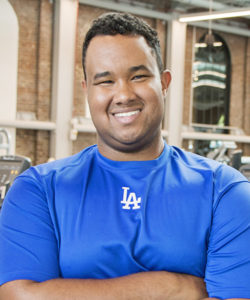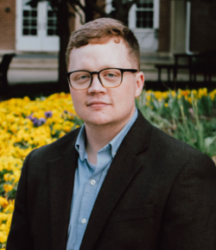Though everyone working at HDI is a champion of some sort, one of us has the medals to prove it.
Morgan Turner, a program education assistant for HDI, won three games at the Kentucky Special Olympics Summer Games, which were held in Richmond from June 2 to 4. In total, Turner played and won three games. He competed alongside his cousin Sam, who served as a Unified Partner – that is, a person without a disability who participates in the games alongside someone with a disability.
“I’ve won several medals in the past, however I’ve never won a medal with my cousin and that made it even better,” Turner said. “I told him before I didn’t care if we won or lost, I was just happy to compete alongside him and whatever happens, happens and luckily a gold medal came out of it.”
In preparing for the games, Turner faced a challenge – he and his partner both had busy schedules that made it difficult to practice together.
“My cousin is a senior at Danville High School and played baseball for them,” he said. “I have my own set so me and him would practice on the weekends”
However, it certainly didn’t help that they, quite literally, had a lifetime of experience playing with one another.
“We also would play bocce ball on our family vacations through the years,” Turner said. “I feel like that helped prepare as well.”
That, and Turner has a ton of experience at the Special Olympics, having already competed in a number of sports and taken home multiple medals in his fields.
“I’ve competed in Special Olympics for about thirteen or fourteen years,” he said. “I compete in softball, basketball, flag football, and bocce ball.”
These events give him the chance to do what he really enjoys – to make new friends and to play the games he loves.
“I just love sports and love to compete and meeting new people and getting to know them,” he said. “Special Olympics allows me to do all of that.”
Turner wasn’t the only representative of HDI at the Special Olympics. Trent Marcum, a Disability and Health Program Facilitator, assisted in running the health promotion tent for the Healthy Athletes Program alongside Lindsey Mullis, who led the team, and other HDI volunteers such as Andrea Deweese, Kristen Dahl and Lisa Amstutz along with other volunteers from EKU and UofL.
“We work several different booths where we collect information for Special Olympics including basic data like height, weight, and blood pressure.” Marcum said. “Additionally, we have a set of questions to ask athletes on topics regarding tobacco, hygiene, sun safety, nutrition, and physical activity. We also host several more fun and engaging activities where participants can win prizes and play games while learning how to improve their health. The heart of what we do is in the conversations we get to have with athletes and their families, and that’s where we hope to leave a lasting impact.”
They also offer fun and games at their booth. This was the first time they were inside, which Marcum said was a welcome relief from the sun, and plenty of HDI volunteers showed up to help out.
“It went really well,” Marcum said. “We’ve had games in the past where we haven’t had a lot of volunteers…This year, it was nice to have ample people for all the booths.”
It also helps get people from the community involved and helps educate them about how to support people with disabilities.
And they had another helping hand – none other than Morgan Turner, who was too busy competing to work the event, but helped out with setup. “He is always extremely helpful,” Marcum said. “He helped me on Friday get all of our stuff ready to take…he’s the best.



